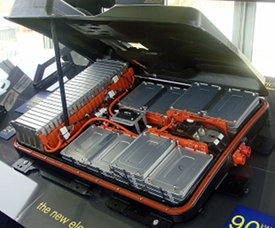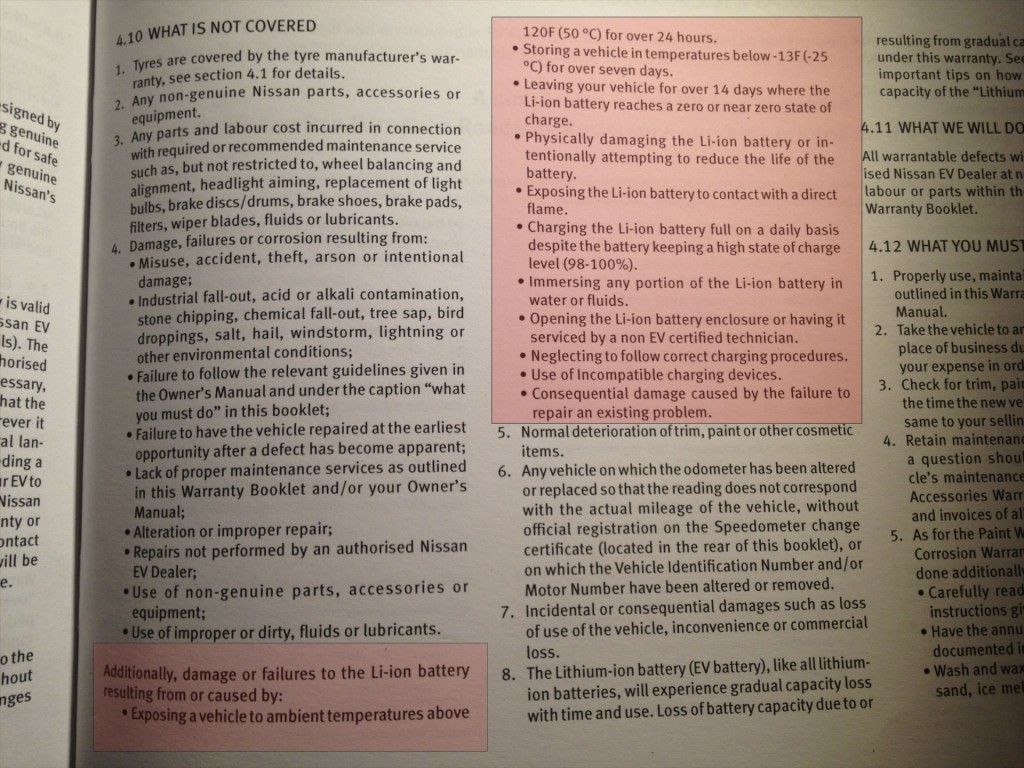Yesterday, we covered a story about several Tesla Roadster owners -- and one in particular -- who claim that Tesla caused them to turn their $109,000 cars into very expensive bricks.
The owners in question claim that Tesla didn’t make them aware that leaving a roadster unplugged for extended periods of time could slowly discharge the Roadster’s 52-kilowatt-hour battery pack, killing them forever and saddling owners with $40,000 repair bill.
But while the arguments in the bricked Tesla Roadster story flame on, we dug out the paperwork that came with out 2011 Nissan Leaf to see what we are required to do in order to keep the battery warranty valid.

Lithium-ion battery pack of 2011 Nissan Leaf, showing cells assembled into modules
Here’s what we found out.
No Extreme Temperatures, Or Daily Top-Off Charging
In its warranty booklet -- and its owners’ manual -- Nissan says that “Exposing a vehicle to ambient temperatures above 120F for over 24 hours” will result in invalidating the car’s battery warranty.
Similarly, Nissan warns it will invalidate a battery warranty claim on a Leaf stored at temperatures under -13F for more than seven days.
Additionally, Nissan warns against “Charging the Li-ion battery full on a daily basis, despite the battery keeping a high state of charge level (98-100%).”

2011 NIssan Leaf Battery Warranty Information
In other words, it advises against charging your Leaf to full when the battery state of charge is already above the 80 percent full mark, or in fact regularly letting your leaf to enter its automatic charge cycle when the battery state of charge is above 80 percent.
No Purposeful Damage, Or Unapproved Maintenance
Trying to open the battery pack, physically damaging it or intentionally attempting to reduce the battery pack’s life are both prohibited under the terms of the Leaf’s battery pack warranty.
Similarly, Nissan will invalidate your Leaf’s battery warranty if you allow a “non EV certified technician” to service your battery pack. While the warranty doesn’t specifically rule out independent electric vehicle specialists, we’ll assume Nissan could reserve the right to refuse a warranty claim if your Leaf isn’t looked after by a Nissan-approved mechanic or dealer.
No Liquids, No Flames
As you’d expect, Nissan also warns that the Leaf battery warranty will be invalidated if any part of the battery pack is exposed to a naked flame, or immersed in liquids.
Since the Leaf battery pack is encased by a steel frame, we think it would be particularly hard to intentionally set alight to -- or flood -- the Leaf’s battery pack outside of a several collision.
The All-Important Anti-Brick Clause
Just like Tesla advises customers against long-term storage when the battery is nearly empty, Nissan clearly states in its manual and its warranty that “Leaving your vehicle for over 14 days where the Li-ion battery reaches a zero or near zero state of charge” will invalidate your warranty.
Additionally, Nissan provides these sage words of advice in the owners’ manual.

2011 NIssan Leaf Battery Warranty Information
“The Li-ion battery discharges gradually if the vehicle is parked for a long time. Nissan recommends charging the Li-ion battery every 3 months using the long life mode charging method to keep the Li-ion battery in good condition. Do not leave the Li-ion battery fully discharged or with a very low charge level for a long period of time.”
In other words, just like every other electronic device which uses batteries, the batteries in your Nissan Leaf will deteriorate if you do not look after them properly.
Owners Sign The Warranty
What’s more, when Leaf owners buy their cars new from the dealer, they should sign a page in their warranty saying they fully understand its conditions.
We did, along with a sheet to say that our dealer had explained the charging habits associated with good battery maintenance as outlined in the manual.
In conclusion however, we’ve got one simple piece of advice.
As with any new car, buyers should read the manual and warranty to ensure they stay within the rules set out in them -- and to avoid any unexpected repair bills.
+++++++++++













